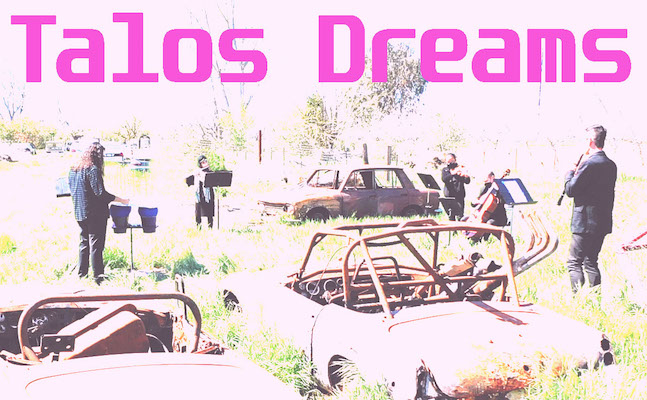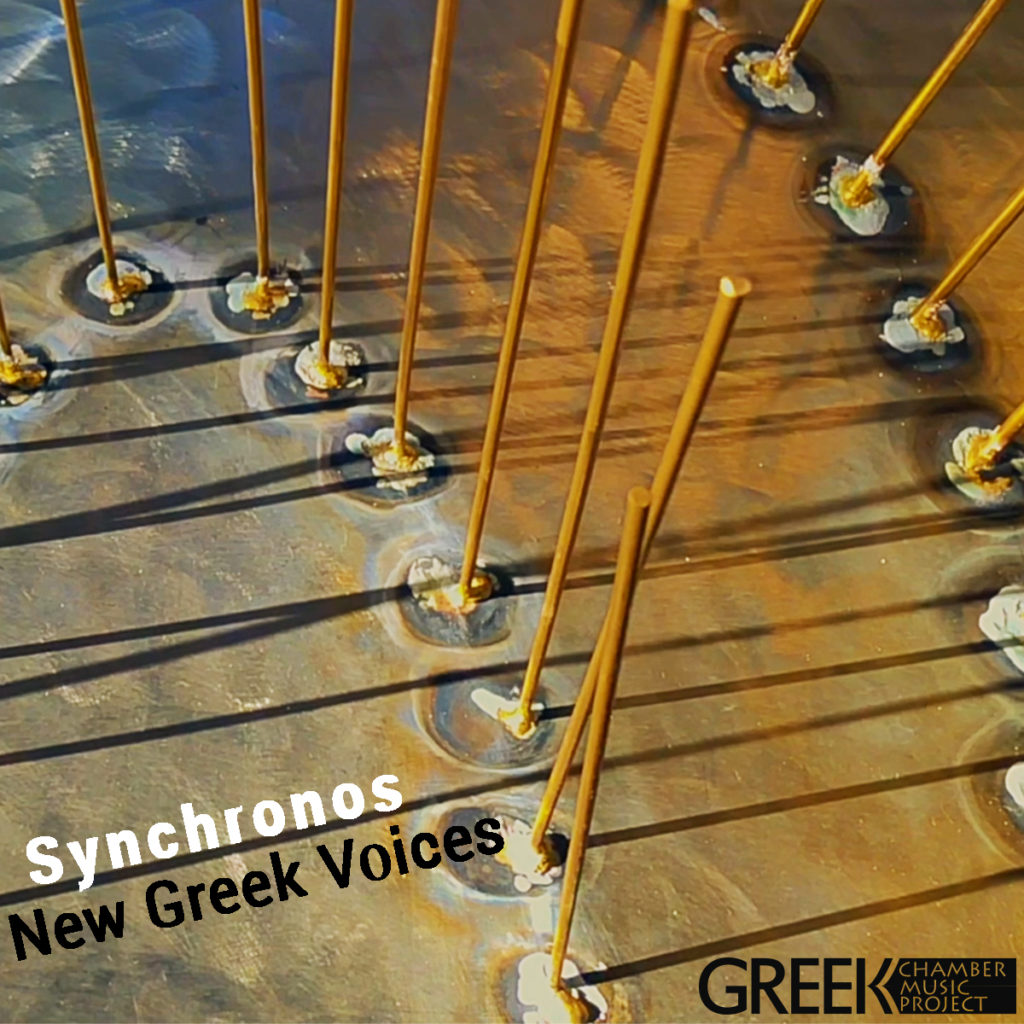Composed by Costas Dafnis
A production of the Kombos Collective

Artists
Ellie Falaris Ganelin, flute
Kyle Bruckmann, oboe
Ariel Wang, violin
Lewis Patzner, cello
Costas Dafnis, ghostplate
Program
Ichor
Ensemble
Aubade
Ellie Falaris Ganelin, flute
Solitude
Ensemble
Artifice
Kyle Bruckmann, oboe
Body Heat
Ensemble
Pandora
Ariel Wang, violin
Mechanism
Ensemble
Nocturne
Lewis Patzner, cello
Program Notes
The text-prompts that accompany each movement were written by the composer and completed by artificial intelligence. The sections written by a human are in black.
The sections in blue were generated by the Megatron-11b neural network.
1. Ichor
Talos, the first robot to walk the earth in Greek Mythology, is forged from bronze by Hephaestos, the god of invention and craftsmanship. The muses pour ichor, the life-giving blood of the gods, into a single vein that runs the length of his body and seal it with a bolt on his ankle.
The long and wordy
The Evenborn
The many-petaled astronomers the glacial
and the sublime stretched memory-
threads connecting and holding at Bay
The inflated ideas of children dreaming
all the way
Elderly struggles to not-forget-me
Eyes closed tight in the halflight to roam gloaming in the stealing
all the way
Mining the appreciated interminable
Home
to the expansive
most sublime or jealously hunted night sky
pointing the horizon the calling from the past
in every hum of construction and murmured complaint
of repair the rending of talons
against a contract signed
the victor the only winner
no surprises that such things
and thought
should be treated with care.
2. Aubade
Queen Pasiphae, enchanted by Zeus, falls in love with a bull in her husband King Minos’ herds. She enlists Daedalus to construct a replica of a cow, hollow and large enough to crawl inside.
Shadows lengthen alpine sighs
Painting bright lodes of moonspill
Between the trees
Here I am
Unchanged and unmoved
Here I am
And here I will be in one
Maybe two hours.
Bronzed. Exalted.
Perhaps, this must be what Zeus felt when he crossed the river Styx with the deified Persephone, or when Poseidon, with an errant foot, splashed into the Sea of Lethe and released the great Leviathan. It is surely what Empedocles felt as he finished his own shining age, when he finally embraced the cosmos and became a genius—a sage sage, a prophet, a teacher.
For a moment, back at the bridge, I wonder if he is comparing me with the faun. Surely, I have failed to achieve this near-ideal. How?
3. Solitude
Talos patrolled Minos’s kingdom by marching around the perimeter of the large island three times each day. Designed and built by Hephaestos to repel invasion, Talos was programmed to spot strangers and pick up and hurl boulders to sink any foreign vessels that approached Crete’s shores.
Adrienne Mayor, Gods and Robots
The grey ash and ground-gore rocks
The shimmering ore unearthed on impact throwing sky-reflections
the smell of red fir and twisted pine rising toward infinity
in a spalted pall of smoke
knowing something greater is at hand
It is there in the shimmering pile of broken stones
and the fire from a centaur steel cleaver
The metamorphic finger of a scarred red-headed woman
twisted with age into swirling steel
And a great caveman wails into the blizzard
one last pleading moan
a fierce yet fearful cry
when they stand in the woods
when they feel it coming
The storm on the mountaintop
The storm in the valley
The storm in the camp
closing in
a green black night
Drink
4. Artifice
Unlike the divine powers of the gods or Medea’s witchcraft that melded biotechne (“life through craft”)with sorcery, Daedalus’ cunning devices and human enhancement schemes were achieved without magic. Using familiar tools, methods, techniques, and materials, Daedalus deployed creative expertise and technology to achieve wonderful results.
His specialty was statuary so true to life that the figures were believed to be capable of movement. The word daedala came to describe wonders, statues and marvelous images so realistic they seemed beyond the scope of human manufacture.
Adrienne Mayor, Gods and Robots
Watchmen, give us second sight
Lensmen, give us eyes to see
Hours are short, our minutes light
In ad perennis tellus of the night,
Songmen, voice annual day
Annual bright, annual you, and me.
Send fiery shining above
Cloud’s masque; flames the fire, stream
A million voices, and I, and you.
Melodies, notes, ringing bells, shriek
Salve for unhappiness, lift me up
Let me sing away all my sorrow
And joyful dreams, joyful sight
Sun, moon, star, moonlight, Earth, sea.
5. Body Heat
Talos possessed another capability too, modeled on a human trait. In close combat, the mechanical giant could perform a ghastly perversion of the universal gesture of human warmth, the embrace. With the ability to heat his bronze body red-hot, Talos would hug victims to his chest and roast them alive.
Adrienne Mayor, Gods and Robots
The ephemeral immediate
The rapturous Joy-breaths or cold-sputtering reprieves at most fear-me-deaths that pistol distant bodies and crash toward our own
The plaintive melody of a melting drum:
Pyriscence
a play, pantomime in song; an adaptation to the stage of Phyrriscence, as the occasional and intermittent promenade
a wild or stormy hurricane wind of hot breath, of gale-force with a mean spate:
Pyrrescence (dyed blackly with fire), burning with heat of the tongue, with heart-felt fancies and plaints
The preposterous absence of all intermediate air to wet through; the sudden dissolution of all bodies into warm perspiration or as if the parts were absorbed in the blood
The injurious effects.
6. Pandora
To punish mortals for accepting fire stolen from the gods by Prometheus (whose name translates to “Forethought”), Zeus commands Hephaestos to make a “beautiful evil” to bring gleeful malice to mortals in the form of a desirable young female automaton. Pandora (“All Gifts”) is animated by the gods and given to Prometheus’s brother titan, Epimetheus (“Afterthought”).
What of the perennial?
That which exhales time and breathes in resurrections and fears not disappearance between past and pearly everlasting
Self-contained and body-less the cockroach brandishes the key
The cool death of flower is always reborn on the skin
Is the brain colonising the heart?
7. Mechanism
Interlude
The hopes that harden with the warmth of sunrise
Repeating lines of sparkled quartz ichor searing granite outcrops
And sighing in strophes
The perennial beget-me-not
Like the Cyclops pulling down on the grille of the eye
All that was bright is black
Is the death that was light
Is the birth that was dark
The cyclops never fully seen
8. Nocturne
Pasiphae’s niece, the witch Medea “convinces Talos that she can make him immortal–but only by removing the bronze rivet in his ankle. Talos agrees. When this essential seal on his ankle is dislodged, the ichor flows out like molten lead, and his life ebbs away.”
Adrienne Mayor, Gods and Robots
The ancient becomes superficial
eternity gazes inward
painfully
through a million
brilliant broken spectacles
Over all: a single question
Inch the autumn sky
[Here let the voice die]
Death’s final note
that dwells
only in the center of the eye.
No-one but the Ancient remembers
what lies beyond her veil
and the bitter doggerel of black and white
only serves to heighten her
sad and sacred visage.
Only she will know
my tormented soul
could never produce such a melodious hum
and in the years of my life
my soul has also faded
if it ever existed at all.
Each moment is a moment of timeless eternity.
Be brave.
About the Artists
Ellie Falaris Ganelin is a flutist with an engaging stage presence and a unique array of influences. Classically trained, she is also versed in jazz, Latin, Brazilian music, indie, and experimental music. She is based in the San Francisco Bay Area, where she is active as a performer of chamber and orchestral music. She is committed to making classical music inviting and accessible for all as an ambassador and performer for the Awesöme Orchestra Collective. Ellie is the founder of the Kombos Collective, a record label and presenter devoted to the music of Greek composers. She has brought her performances with the Collective to the John F. Kennedy Center for the Performing Arts, as well as cultural centers and universities across the U.S. and Canada.
Composer/performer Kyle Bruckmann’s work extends from a Western classical foundation into gray areas encompassing free jazz, electronic music and post-punk rock. A busy and varied performance schedule and appearances on more than 100 recordings have led to his recognition as “an excellent composer, striking the right balance between form and freedom” (Signal to Noise), “a modern day renaissance musician” (Dusted) and “a seasoned improviser with impressive extended technique and peculiar artistic flair” (All Music Guide). Shortly after moving to the San Francisco Bay Area in 2003, he joined forces with acclaimed new music collective sfSound and with Quinteto Latino (a woodwind quintet specializing in Latin American composers). He is now also a member of the San Francisco Contemporary Music Players, Eco Ensemble, and Splinter Reeds. He has worked as a substitute with the San Francisco Symphony and most of the area’s regional orchestras while remaining active in an international community of improvisers and sound artists.
After almost a decade since the inception of her first grassroots EP, Ariel Wang has come into herself as an artist and musician with the writing and recording of her new full-length album, “Bridges,” which pulls from a deep grounding in folk with traces of metal, western classical music, and progressive rock. Although she identifies as a Bay Area native, and has spent almost two decades in the East Bay, her roots spread wide, having lived as a child in multiple parts of the country from Chicago to Baton Rouge. Her background is a Bachelors in Psychology from UC Berkeley, Masters in Violin Performance from San Francisco State University, truffle-making with local chocolatier Coracao Confections, frolicking in the Northern California woods, and a deep immersion in the East Bay area underground music scene.
Lewis Patzner is a cellist and composer from Oakland, CA, and received his Bachelor’s degree from Peabody, studying with Amit Peled, in 2007. Lewis plays all styles of music and has an extensive list of recording credits, including recently as the featured cellist on the score for the Oscar-nominated film, “Can You Ever Forgive Me.” His past groups include Judgement Day (founding member), Whiskerman (founding member), and La Dee Da. He currently plays with the Town Quartet, Cosa Nostra Strings, Proteus Trio, Musical Art Quintet, and Ariel Wang. Lewispatzner.com
Costas Dafnis is a composer and sound artist based in California. In addition to concert music, Dafnis composes works for theater, dance and games. His orchestral works have been featured by the Cabrillo Festival of Contemporary Music, the Dallas Winds and New Music USA. Recent film credits include Torch with C.R. Coppola and the indie feature Overwhelm the Sky from director Daniel Kremer. His works are published and available through Walton, GIA, Hal Leonard, and Noisi Paintr Music. Dafnis lectures in film at the San Francisco Art Institute and serves on the Technology and Composition faculty at the San Francisco Conservatory of Music.
Credits
Performance, audio and video recording by the artists
Audio mixes by Costas Dafnis
Aerial videography by Ross Robinson
Video editing by Chris Volosevich
Talos Dreams is inspired by the book Gods and Robots: Myths, Machines, and Ancient Dreams of Technology by Adrienne Mayor
Supported in part by the San Francisco Conservatory of Music Faculty Grant

Now available: new album featuring Talos Dreams and other works by Greek composers.
